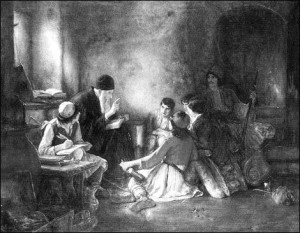Recent newspaper reports find parents disputing the 7:30 AM hour for high school students arrival to school as being deleterious for them because they lose too much sleep. They also point out that their kids social, sports and play life is effected by this early rising. My first thought was “well isn’t that just too bad!” My second thought was of a Greek poem I was taught by my mother when I was a small child. I remember it well to this day, 80 years later.
Το Kρυφό Σχολειό
Φεγγαράκι μου Λαμπρό – Φέγγε μου να περπατώ – Να πηγαίνω στο σχολειό –
Να μαθαίνω γράμματα – Γράμματα σπουδάσματα – Του Θεού τα πράγματα
The Secret School
O my little moon so bright – Shine for me so I can walk – To the school where I may go –
There the letters I will learn – Letters and an education – All about our God’s creation
I meditated on this for quite a while and realized the wisdom of these words. Why is the title of this poem “The Secret School?” Because the poem refers to what the children of the Greeks had to face during the more than 400 year Ottoman Turkish occupation when our people were forbidden to have schools and the children met at night in secret sites, even in caves, so that they could learn to read and write their mother tongue and the truths of our religion. They were perilous times, for the Turks did their best to eliminate our people from their ancestral homelands. But the desire for an education was so strong in these people that they did everything they could to maintain it. Yet modern American parents are so concerned that their children’s social lives will be ruined by their school attendance at an early hour.
The Christian people of the eastern Mediterranean valued their Church and an education above all else and the Arabic invaders valued them because of this to such an extent that our people were employed by them as important civil officials. It was different once the Arabs were supplanted by the Turks. My father had only three years of schooling when he left his beautiful home town of Miriophyto on the coast of the Bosphorus, a town that received its name from the myriads of wild flowers that graced it and whose Greek name has not been changed by the Turks to this day. He went to sea as a cabin boy, later as a sailor, and had never returned but kept in touch with his family by mail. As a sailor he worked on all kinds of boats from freighters under sail to steamboats, and he could perform any duties required of him from carpentry, painting, plumbing, electricity and cooking – having built a bakery and baked bread with the World War I U.S. Expeditionary Force in France. In America he taught himself to read and write English and he was an avid reader of our local newspapers. He and my mother exerted every possible effort to assure my education. They personified the spirit of Hellenic parenthood.
However, This poem doesn’t stop at education, but goes on to All about the works of God. It was this attitude that assured the continuation of Orthodoxy through many generations of oppression. It is something that is missing in our modern secular society, where not only our Orthodox families but also those of all Christian sects are finding their youth increasingly being lost to Christ. Gradually we are being overwhelmed by a flood of agnostics and atheists. Orthodox teachings do not degrade the necessity of considering the role of God in our education, but consider it essential that all of our pursuits should be accompanied by prayerful thought. Unlike the attitudes which pervaded the western societies that found conflict between the teachings of religion and science, Orthodoxy found none. After all, God created the heavens and the earth and gave mankind free will and control over this environment and we were free, as feeble as our efforts might be, to try to understand the workings of God. So let us study God’s creation, but do it prayerfully with full thankfulness and admiration for all that He has done for us. Thus we shall find peace and serenity within our minds and souls.
© John P. Nasou, M.D. March 18, 2009
(Washington, DC)
Nikolaos Gyzis:
Κρυφό Σχολειό [Secret School], c. 1880

